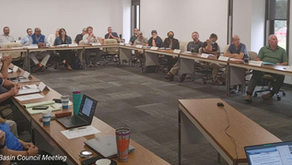Helpful Tips When Pulling the Plug on Facilitated Team Efforts
- JD Solomon
- Jul 15, 2024
- 3 min read

Facilitated team efforts are a key part of achieving success in many organizations. They involve guiding a team to work together effectively to reach common goals. Sometimes, it becomes necessary to end these efforts. This could be due to various reasons, such as the completion of a project or a change in organizational priorities. There are certain things to do well and some that should be avoided when pulling the plug on facilitated team efforts.
Three Things to Do Well
Clear Communication
Communicating clearly with the team about why the facilitated effort is ending is essential. Provide a clear explanation of the reasons and ensure everyone understands. This helps in preventing any misunderstandings or negative feelings. When team members know the rationale behind the decision, they are more likely to accept it and move forward positively.
Recognize Achievements
Recognizing and celebrating the team's achievements before ending the effort is crucial. Acknowledge the hard work and success the team has accomplished. Acknowledgment boosts morale and leaves team members with a sense of accomplishment and pride. It's important for the team to feel that their efforts were valuable and appreciated.
Provide Next Steps
Offer guidance on what will happen next for the team members. Whether they will be reassigned to new projects, given new roles, or provided with training for future opportunities, having a clear path forward helps transition smoothly. Providing a framework for the next steps reduces anxiety and helps team members stay focused and motivated during the change.
Things to Avoid
Avoid Abrupt Terminations
Ending a facilitated team effort suddenly without prior notice can create confusion and dissatisfaction among team members. It is important to give ample notice and prepare the team for the transition. Sudden changes can disrupt workflows and harm team morale.
Avoid Negative Criticism
Avoid focusing on what went wrong or criticizing team members when closing down a facilitated effort. Negative feedback can demoralize the team. Instead, focus on constructive feedback and highlight the positive aspects of the team's performance. Constructive feedback encourages a positive attitude and a willingness to improve in the future.
Avoid Ignoring Emotions
Teams often form strong bonds and a sense of camaraderie. Ignoring the emotional aspect of ending a facilitated effort can lead to feelings of resentment or loss. Acknowledge the emotional impact and provide support.
Avoid Lack of Follow-Up
Once the facilitated effort ends, don’t just leave the team members to fend for themselves. Follow up with them to ensure they are adjusting well to the change.
Avoid Inflexibility
Plans (and politics) change, and the need to end a facilitated effort might arise unexpectedly. Being rigid and inflexible can cause unnecessary stress. Be open to adjusting plans and timelines to accommodate the needs of the team and the organization. Flexibility can make the transition smoother and less disruptive.
Pulling the Plug on Facilitated Team Efforts
Bringing an end to facilitated team efforts is a delicate process that requires careful planning and execution. You can ensure a positive transition by communicating clearly, recognizing achievements, and providing the next steps. On the other hand, avoiding abrupt terminations, negative criticism, ignoring emotions, lack of follow-up, and inflexibility will help maintain team morale and productivity. Handling this process well preserves the team's integrity and sets a positive precedent for future efforts.
JD Solomon Inc. provides solutions for program development, asset management, and facilitation at the nexus of facilities, infrastructure, and the environment. Sign up for monthly updates related to our firm.




Comments